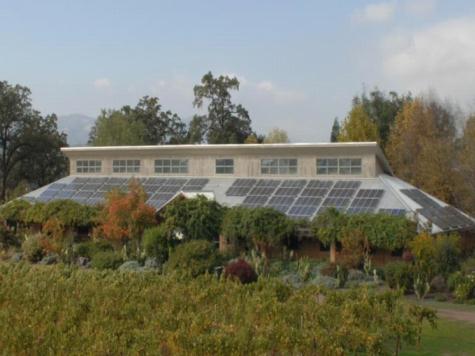Creating Award-Winning and Sustainable Wines
Fetzer Vineyards is not only popular for its affordable and palatable wines; the company has been a recognized role model for sustainability since it formalized its commitment to the environment in 1998.
Fetzer monitors every decision they make to ensure their carbon emissions create minimal impact. They employ numerous actions to maintain a green business that have helped to protect the environment, save money, and gain them a tremendous amount of recognition. Fetzer’s vineyard has been recognized for a wide range of programs including hosting the wine industry's largest solar array, steering an effort to use innovative lightweight glass in wine bottles, a zero waste approach to waste management with significant waste reduction achievements, utilizing natural farm practices, and promoting energy and water conservation.
In 2006, Fetzer joined the Climate Action Reserve to voluntarily report and monitor their greenhouse gas emissions. Fetzer’s vineyards are also certified through the California Certified Sustainable Wine growing program.
How does Fetzer focus on energy efficiency and conservation annually?
Fetzer Vineyards knows the importance of energy conservation and the benefits that come with it. In order to conserve energy in their workplace, Fetzer upgraded their old lighting fixtures to more efficient linear fluorescent lights, which saved money and earned them a rebate from their utility company. In 2008, Fetzer began their lightweight bottle initiative by reducing the weight of millions of bottles by seventeen percent. This action reduced the energy used to manufacture the bottles by an estimated 4.4 million kilo-watt hours. Fetzer also makes an effort to use clean, renewable energy by purchasing renewable energy from their electricity company. They have solar panels installed on top of their administration building and barrel room, satisfying the majority of their energy needs in an environmentally friendly manner.
How does Fetzer conserve resources?
Fetzer strives to minimize the use of feedstock and consumption of natural resources to generate their product. Fetzer’s lightweight bottle initiative not only reduces the amount of glass used in making their bottles, but also the amount of fuel used in transporting them. They also focus on conserving water resources by installing water meters to monitor their overall water use. They use timed drip irrigation system in the field to use water more efficiently, and installed ponds to store rain as a water source.
What other green practices does Fetzer employ?
Fetzer farms its own vineyards using certified organic practices. Fetzer maintains soil health by using compost produced from their leftover waste, such as grape skins and stems. They also use cover crops in their vineyards to prevent soil erosion and attract beneficial insects as a natural “pesticide,” rather than using fossil-fuel based synthetic chemicals.
Fetzer considers the environment in the decisions they make, from transportation choices to the construction of their facility. Employees use electric vehicles on site and company hybrid vehicles are used by those that travel outside of the complex. In addition, two vans are offered to employees for carpooling. As for their facilities, Fetzer’s administration building was built from recycled material and uses green building methods, such as rammed-earth construction with thick walls for insulation, passive night-air cooling, and solar panels.

A green vineyard and winery offering 12 different varieties of wine and home to the largest solar array in the wine industry. Fetzer’s administration building is topped with a 40 kilo-watt solar panel array. This array provides the majority of the building’s energy needs.
Green Actions:
- Installed a 4,300 solar panel PV array and purchases 100 percent renewable energy for operations
- Uses motion sensored, energy-efficient linear fluorescent lighting
- Installed insulation on the wine tanks
- Started a lightweight bottling program and uses 35 percent post-consumer recycled glass for bottling
- Uses electric and hybrid vehicles and promotes carpooling
- Reuses or recycles a majority of materials, such as pallets, barrels, and office supplies
- Composts on site & uses compost for soil amendment
- Built their administration building using green building materials
Total Cost Savings:
- $28,500 annually from lighting retrofits
- $310,000 annually from recycling and waste reduction efforts
- $7,000+ in energy cost savings from insulating more than 30 percent of their wine tanks
Total Greenhouse Gas Savings:
- 1,500 tons of CO2 per year from renewable energy (equivalent to annual CO2 emissions from 204 homes running on electricity)
- 3,000 tons of CO2 per year by using lightweight bottles (equivalent to the CO2 emitted from burning 305,107 gallons of gas)
